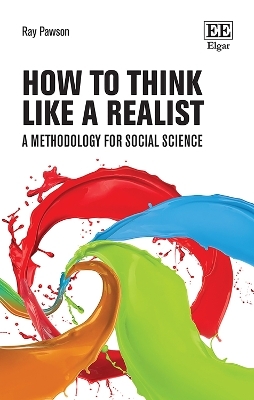
How to Think Like a Realist
Edward Elgar Publishing Ltd (Verlag)
978-1-0353-2109-4 (ISBN)
This unique book pairs outstanding clarity of detail with an accessible approach, exploring the three great methodological challenges in social research: how to think about causality, objectivity, and generality. Presented in accessible bite-sized episodes, it offers a rich diet of practical illustrations, enabling the reader to absorb the variety and breadth of realist inquiry. How to Think Like a Realist is written in Ray Pawson’s customary style; informed, bravely non-conformist and with a splash of mischief. Pawson offers a dextrous rebuttal to the threats that social inquiry faces in an era of post-truth. The text provides crucial guidance for those looking to better understand the central tenets of social science research methodology in the twenty-first century.
This innovative book will be an essential resource for students and early career researchers as well as experienced academics and practitioners from across all social science disciplines. Its breadth of coverage and accessibility makes it an ideal text for teaching social research methodology at both undergraduate and postgraduate levels.
Ray Pawson, Emeritus Professor of Social Research Methodology, University of Leeds, UK
Contents:
Preface xiii
PART I HOW TO THINK ABOUT CAUSALITY
Introduction to Part I 2
Episode 1. The oldest maxim: correlation does not equal causation 6
Episode 2. Harré’s distinction between successionist and
generative causation 10
Episode 3. Stinchcombe’s challenge to students (and the rest of us) 14
Episode 4. Newer maxims: contingency clouds causation;
mechanisms are not variables 17
Episode 5. Generative thinking in pharmaceutical inquiry: the
drug development pipeline 23
Episode 6. Provisos: the transience of causal relationships and
the influence of context 31
Episode 7. Mechanisms, contexts, and demi-regularities in social science 36
Episode 8. Causation and change: Coleman’s boat and the Caucus race 42
Episode 9. Causation in complex systems: boundary conditions
and stopping rules 50
Episode 10. Generative thinking in sociology I: Goldthorpe on
social mobility 59
Episode 11. Generative thinking in sociology II: Boudon on
educational inequality
Episode 12. Generative thinking in programme evaluation:
Pawson in prison 72
Episode 13. Generative thinking in comparative historical
research: wither protest movements? 77
Episode 14. Generative thinking in qualitative longitudinal
inquiry: following young fathers 82
Episode 15. Generative thinking in legislative analysis: Megan’s Law 87
Episode 16. Interlude 92
PART II HOW TO THINK ABOUT OBJECTIVITY
Introduction to Part II 96
Episode 17. The empiricist myth of direct, sensory observation 100
Episode 18. The constructivist myth of omnipresent, omnipotent opinion 105
Episode 19. The empiricist myth of balanced, impartial observation 111
Episode 20. The constructivist myth of partisan science 119
Episode 21. Objectivity reclaimed: introducing post-empiricist science 123
Episode 22. Theory-informed evidence: excavating data in social
science 133
Episode 23. Theory adjudication in social science 140
Episode 24. Building evidence networks in social science 146
Episode 25. Organised scepticism or mutual incomprehension? 152
Episode 26. Postscript: post-empiricism versus post-truth 156
PART III HOW TO THINK ABOUT GENERALITY
Introduction to Part III 165
Episode 27. Two modes of generality: simple and extensional 169
Episode 28. Generality in the spoken word: indexicality versus
abstraction 175
Episode 29. Generality in behavioural science: universal subjects
or WEIRD samples 182
Episode 30. Generality as typicality: the simplifications of sampling 189
Episode 31. Generality in medical science: how representative
are clinical trials? 198
Episode 32. Case studies and generality: transcending the single case? 207
Episode 33. Incremental steps to generality: within-case comparisons 215
Episode 34. Middle-range theory and the confederation of explanation 221
Episode 35. Populating, testing, and scoping middle-range theory 230
Episode 36. Research synthesis as generalisation 235
Episode 37. Comparison, complexity, and the specification of ignorance 243
Afterword 251
References 253
| Erscheinungsdatum | 10.05.2024 |
|---|---|
| Reihe/Serie | How to Research Guides |
| Verlagsort | Cheltenham |
| Sprache | englisch |
| Maße | 156 x 234 mm |
| Themenwelt | Geisteswissenschaften ► Philosophie |
| Sozialwissenschaften ► Politik / Verwaltung ► Staat / Verwaltung | |
| Sozialwissenschaften ► Soziologie ► Empirische Sozialforschung | |
| ISBN-10 | 1-0353-2109-2 / 1035321092 |
| ISBN-13 | 978-1-0353-2109-4 / 9781035321094 |
| Zustand | Neuware |
| Informationen gemäß Produktsicherheitsverordnung (GPSR) | |
| Haben Sie eine Frage zum Produkt? |
aus dem Bereich


